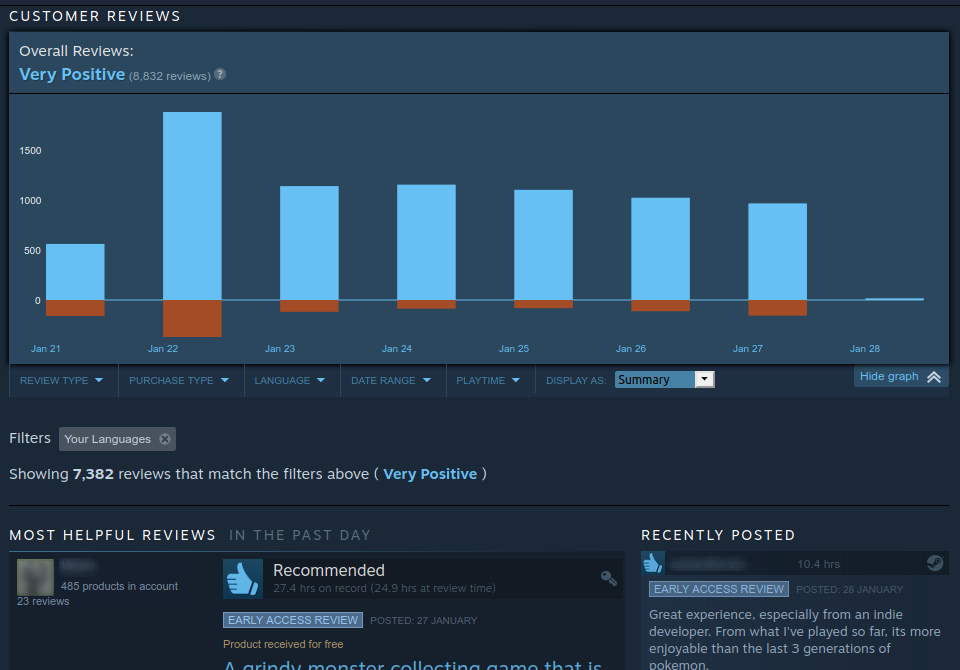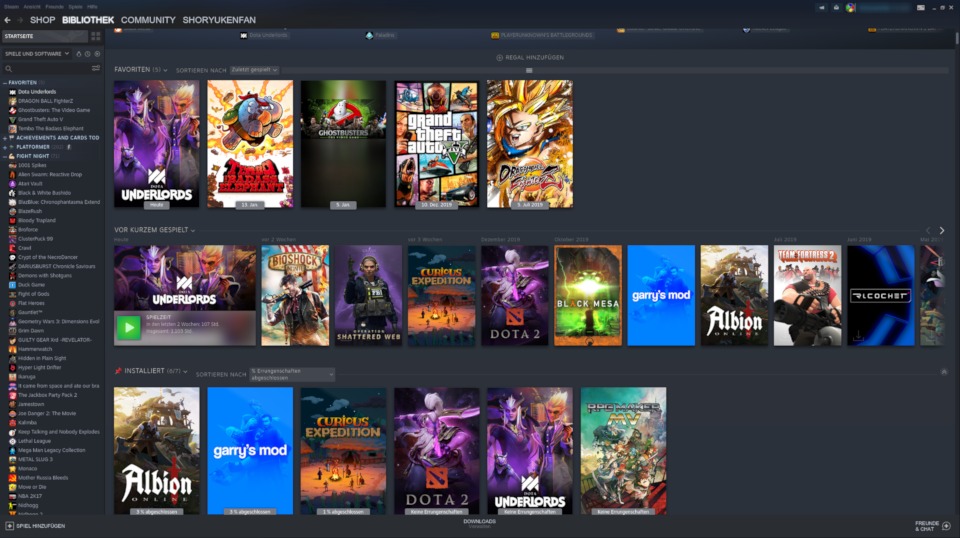A year and a lot of controversy has passed since the introduction of the Epic Games Store. Some things have changed, some didn’t. Here is why I don’t accept the store.
Let’s face it, Epic is not going anywhere on PC now and they keep doing what they do. Nothing against a good competition, so they have to improve in order to keep up and ultimately the consumer would benefit of the outcome. Unfortunately, the reality is different. Epics store is bare bones and they are paying developers and publishers to release the games timed exclusively. Some of the features are already included, some are planned for the future. But right now, the shop and launcher isn’t where it should have been.

Linux support and Steam Play
My daily main system is operating under Linux and sometimes Windows for gaming. I would like to get rid off Windows or minimize the usage of it some day, although that won’t happen anytime soon. Steam supports native Linux build/ports. It goes even further. Windows based games can be played on Linux with the support of an integrated software called “Proton” (based on WINE and DXVK), without or with little performance hit. This is probably the one single most critical argument why I stick with Steam. If you are interest into this, look at the site ProtonDB, a community driven service for reporting and listing games compatible with Proton.
Currently there is no official Epic Games Store on Linux, but some games can be installed through an alternative application called Lutris. It have support for non Linux games too, amongst other things.
User reviews, ratings, discussions

I don’t accept a gaming market place on PC where users have no voice. The open nature of the platform and ability to express myself is important to me. I am a customer and know that my voice matters. In Steam every customers rating have an impact on the overall score, excluding detected review bombs. This approach is vastly different to a site like Metascore, where everyone can claim to own the game without proof. Sometimes I sneak around in the review section to see what others don’t like and have to say about a game. Even the playtime when writing up the review is displayed.
Splitting up my game library and friends list
Not a feature, but a big deal to me. By adding a second major platform on my PC comes with some down sides regarding to game library and friends list. Displaying achievements, sorting collections and search results are incomplete if the games are on the other platform. Settings in one application won’t affect the other, so I end up managing two worlds, with overlapping friends in the list. And only if I convince my buddy to create an account and install the other shop/launcher too.

Other essential features
- Streaming technologies: This is a set of related free online services with a lot of potential. No need to setup another application and account, it’s all integrated into Steam. Remote Play allows to play Steam games on your phone or any other device, by streaming the video content to it. Similar to Stadia, but instead using your PC. This feature also allows to play local offline co-op games through the internet with your friends. And the best part is, your friends don’t need to own the games. Then there is live broadcasting your gameplay for watching, comparable to Twitch. Access can be limited to Steam friends if you wish.
- Library management: The library got a huge rework recently, added bunch of useful sorting, filter and custom collection features. It is quite flexible and easy to use. With the huge number of titles in my library, this is a very welcome way of organizing my games.
- Achievements: I enjoy hunting achievements, showcase on my profile and compare them against other players, which adds another layer of fun and challenges.
- Gamepad extended support: Steam supports a lot of variety of gamepads, custom button mappings, has unique features with endless possibilities and even games without official controller support can be configured to play with. Profiles (custom settings) can be uploaded and downloaded from other users.
- Family Library Sharing: Allows family members to play my games for free, as if they owned them, with their personal progress and achievements. It is the digital representation of borrowing the games, but only one person at a time can use the whole game library. My brother definitely enjoys it.
- Forums: Each game and other categories in Steam have its own dedicated discussion forum. There is no need to search for an official or unofficial forum. The benefit of this integration is that you don’t need to create lots of accounts, remember passwords and everything is in one homogeneous hub, including message notifications and settings.
- Mods/Workshop: While I don’t make much use of mods on PC games yet, only a couple of times so far, I really appreciate the integration and love the creativity of the fans. The experience is so much more clean and secure, compared to installs from random websites.
- More nice to have extras: And then there are ton of small stuff, that adds up to the overall experience and usefulness, in example a shopping cart, uncomplicated refunds, a wishlist, screenshot management, groups, curators, guides, user profiles, news feeds… the list could be endless, so I have to make a cut somewhere.

Additional issues
There are some controversial surrounding Epic. The way how exclusivity was handled in some cases was just unacceptable. Large portion of Epic is owned by Tencent, a Chinese giant; not a direct issue, but I am cautious about this fact. To make matters worse, there was some criticism about spying Steam users. Finally some of the important missing features on launch was added later, in particular cloud saves, offline play, playtime tracking, regional pricing, just to name a few.
The Epic Games Store or any game on it can’t be installed native on my Linux based operating system. There are some alternative possibilities through Lutris, but I don’t want to support this behavior if possible. While some features are implemented since the stores launch, it still lacks a lot of useful and important stuff. The weekly free game offerings aren’t interesting enough to me; essentially paying the user to use their platform. Those non Steam games could be added manually to my Steam library in Windows to enable some features, but that won’t solve the core issues.
Conclusion
For now, the Epic Games Store will be ignored and avoided. If it is working for you, fine, but this is my personal opinion and reasoning. Have in mind, this list is a snapshot of the time of the writing and the points brought up in this article might be not true in the future. Let’s hope so. Feel free to share this article with your friends and community. I am always happy to read your comments.


I wouldn’t mind the Epic store if it wasn’t for the exclusive deals. Most of those deals have been straight up assholery, like games that were already advertised on months for Steam and then bought to be Epic exclusives. Even a cute game like Ooblets that was supported by fans via patron and donations changed, their devs became scumbags and insulted their fans just because they weren’t happy with the exclusivity. That’s what the Epic money gets you.
Brute forcing their way in just disgusts me, but what really bothers me is the people that defend it because “freE GaMEs!1!!”, it’s like they’re the native americans when Colombus arrived with shiny mirrors, they’re just being lead around and have no self respect.
LikeLiked by 1 person
Yes, if no one wants to use your software, pay them to use it. That is essentially what the free games and the exclusives are. Tim says, this is competition and healthy, but exclusives take competition away. And I tell you something healthy. Epic brought Psyonix, stopped the Linux support and version of Rocket League and now they are taking it away from Steam too. Is that healthy? I can’t play the game I payed for (Linux), but its actively developed.
LikeLike